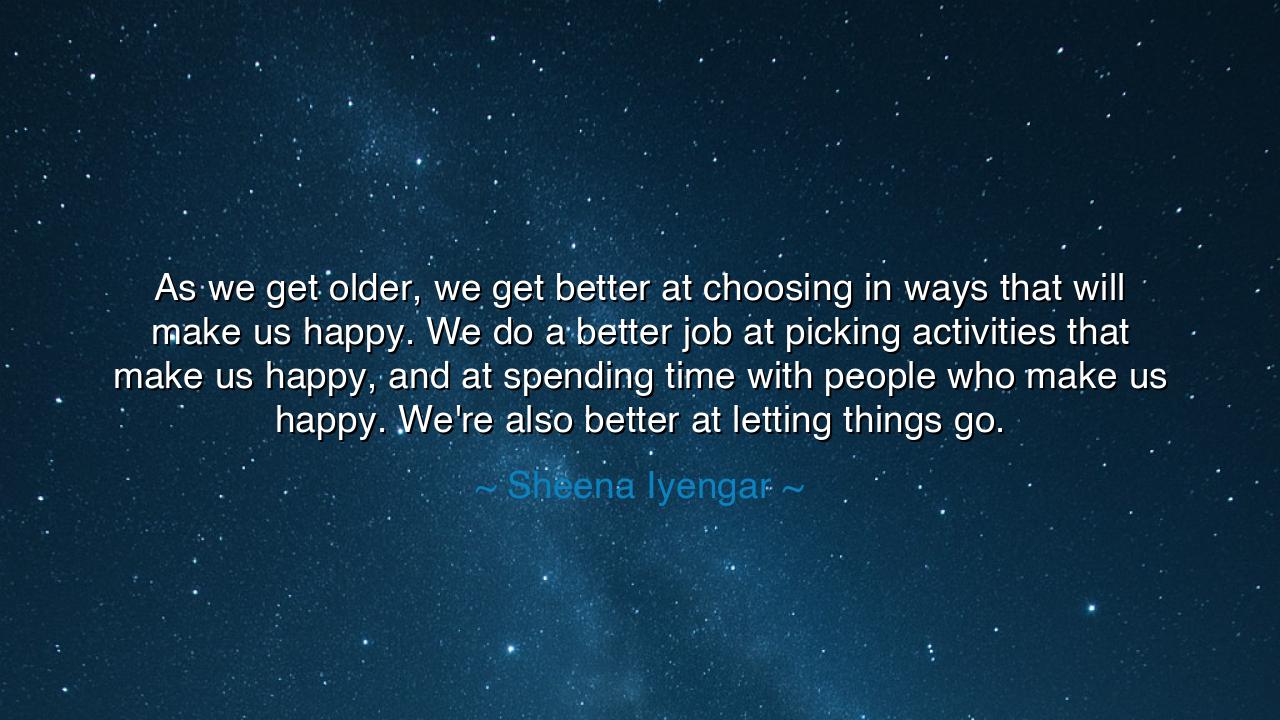
As we get older, we get better at choosing in ways that will
As we get older, we get better at choosing in ways that will make us happy. We do a better job at picking activities that make us happy, and at spending time with people who make us happy. We're also better at letting things go.






Sheena Iyengar, a seeker of human choice and wisdom, spoke thus: “As we get older, we get better at choosing in ways that will make us happy. We do a better job at picking activities that make us happy, and at spending time with people who make us happy. We’re also better at letting things go.” In these words lies a deep truth, not merely about age, but about the slow ripening of the soul. For time itself is a teacher, and with every passing year, we learn not only what to grasp, but also what to release.
The meaning of this saying rests upon the wisdom that comes with age. In youth, we chase endlessly—after possessions, achievements, and the approval of others. Our hearts are restless, caught in the web of wanting. But as we grow older, our vision sharpens. We begin to discern what truly nourishes us and what drains us. The noise of vanity fades, and the melody of contentment grows louder. Thus, the act of choosing becomes more sacred, guided not by impulse but by clarity.
History gives us many examples of such ripened wisdom. Consider the life of Nelson Mandela, who, after twenty-seven years in prison, emerged not with a heart poisoned by bitterness, but with the ability to let go of hatred. In his later years, he chose carefully—seeking not vengeance but reconciliation, spending his time with those who would build a better South Africa rather than destroy it. His wisdom was not born of youth, but of long suffering, of the patience of age, and of learning that happiness grows in forgiveness more than in triumph.
Even in the realm of philosophy, we hear the same voice. Epicurus, the ancient thinker, taught that true happiness lies not in endless indulgence, but in simple pleasures: friendship, reflection, and freedom from unnecessary desires. He counseled his followers to choose their activities wisely, to embrace what brings peace rather than turmoil. This is the same lesson Iyengar speaks of—that with maturity, we learn to taste joy not in excess but in the richness of simplicity.
The lesson for us is to embrace the art of mindful choice before age forces it upon us. Do not wait for the twilight years to realize that your time is precious. Begin now to choose people who uplift you, to seek activities that bring genuine fulfillment, and to practice the sacred art of letting go—of grudges, of needless battles, of hollow pursuits. For the sooner you learn this, the longer your life will be lived in light rather than shadow.
In practice, this means pausing before each choice and asking: “Does this bring me closer to joy, or deeper into emptiness?” It means treasuring time with loved ones rather than scattering hours on trivial quarrels. It means keeping your circle small but strong, filled with those who inspire, comfort, and challenge you toward growth. And it means releasing the chains of resentment, for to hold onto them is to carry poison in your own veins.
Thus, children of tomorrow, remember Iyengar’s wisdom: happiness is not an accident, but a choice—a choice that becomes clearer as we grow, but one that we may begin practicing even now. Do not chase everything, for in chasing all, you capture nothing. Instead, choose with care, love with purpose, and let go with grace. In this way, life will not merely be lived, but savored, and your years will not merely pass, but blossom.






AAdministratorAdministrator
Welcome, honored guests. Please leave a comment, we will respond soon